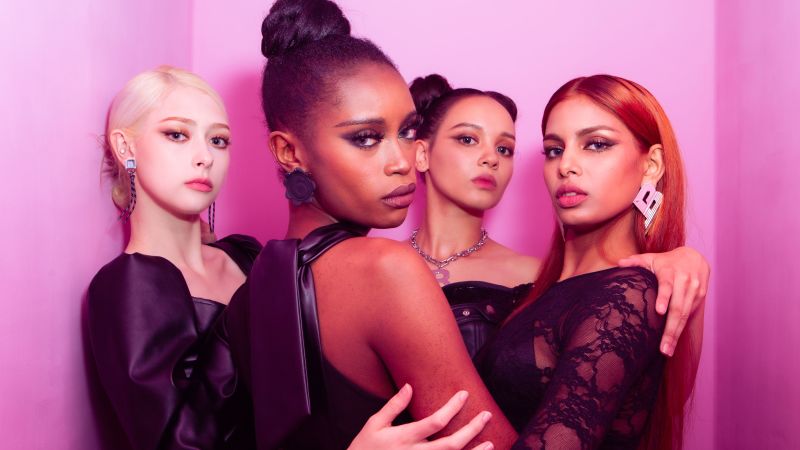Seoul, South Korea CNN – A group of four women, clad in matching chains and studded clothing, take the stage in Seoul, South Korea. As giant speakers blast music, they perform a synchronized dance routine to a crowd of cheering fans. At first glance, they resemble the typical K-pop girl group. However, there’s one notable difference – none of them are Korean. This is Blackswan, a K-pop group consisting of members from around the world. The group, comprised of Gabi from Brazil, NVee from the United States, Sriya from India, and Fatou from Senegal (now living in Belgium), aspires to make a mark in the highly competitive, multibillion-dollar K-pop industry. However, before they can achieve success, they must persuade skeptics of their authenticity.
Including foreign members in K-pop acts is not a new concept. Groups like GOT7 and UNIQ have had a mix of Korean and Chinese members in the past. However, such groups have often faded away or faced controversy. EXP Edition, a boy band with predominantly White members and no Koreans at all, faced accusations of cultural appropriation. Blackswan also faces doubters. At the Waterbomb music festival in June, where Blackswan performed, some attendees questioned the group’s authenticity. Nevertheless, others welcomed the non-Korean lineup as a positive symbol of Korea’s cultural influence on the global stage.
For Fatou, the members’ nationalities and lack of Korean heritage hold little significance. They believe they possess the key elements that define K-pop. As long as they sing in Korean, they consider themselves K-pop. Gabi echoes this sentiment, stating that they have everything a K-pop group should have.
The journey to becoming Blackswan follows a well-established, uniquely Korean path. Each member auditioned as trainees for the highly competitive Korean label DR Music. Simply being accepted as trainees was an achievement. From a young age, the members had a passion for music and performance and aspired to work in the entertainment industry. They discovered K-pop through friends and fell in love with the genre. The path to becoming K-pop stars was grueling. They had to undergo intensive Korean language lessons, grueling rehearsals in singing, dancing, rapping, and more. Adjusting to life in a foreign country and being away from family added to the challenges. Yoon Deung-ryong, the CEO of DR Management, emphasized that the arduous training was necessary to mold aspiring musicians into presentable performers.
While Blackswan’s training was tough, many K-pop stars have experienced even harsher regimens. Some trainees begin as early as eight years old, living away from home in dormitories, adhering to strict diets, and following demanding daily schedules. Blackpink, the global sensation that headlined Coachella as the first Asian act, trained for six years before their debut. Superstar G-Dragon reportedly trained for 11 years across two major agencies. In comparison, some Blackswan members have only been training for a year or less. Despite the challenges, those who overcame the hardships became part of Blackswan.
K-pop’s popularity has surged worldwide over the past decade, with groups such as BTS and Blackpink gaining international recognition. This rise in interest towards Korean culture extends beyond music and includes K-dramas, Korean beauty products, and Korean fashion. As a result, many foreign fans have traveled to South Korea and even learned the language. Becoming a K-pop star has become a natural aspiration for some. Fatou recalled that at the age of 15, a friend introduced her to a K-pop music video, and she became captivated by the genre. While experimenting with different genres, she knew that K-pop was her true calling.
Experts argue that K-pop is not easily defined. It lacks specific musical features or a fixed lyrical style. Many K-pop artists release diverse types of music. Furthermore, the genre is not exclusively tied to the Korean language. BTS, the world’s biggest K-pop group, has increasingly released songs in English. In fact, K-pop as a genre was not initially conceptualized by the South Korean music industry itself. Overseas fans in Asian hubs such as Hong Kong and Taiwan fell in love with a particular type of Korean popular music and labeled it K-pop.
Blackswan aims to captivate the global audience by leveraging their unique backgrounds and offering something fresh to stand out in the saturated market. Their diverse heritage is reflected in the music they produce. They mix Korean with other languages like English and Spanish in their songs. The music video for their recent single “Karma” was filmed in Sriya’s hometown in India, featuring traditional Indian clothing, temples, and local scenery. Sriya expressed her gratitude for the opportunity to represent India on a global platform. The CEO, Yoon, plans to film future music videos in the home regions of the other members: West Africa, Brazil, and the US.
While some skeptics remain, questioning the authenticity of a K-pop group without Korean members, most criticisms come from international observers. Korean fans and artists have shown support for Blackswan. The group’s aim is to challenge boundaries and redefine perceptions of what K-pop can be. Yoon faced opposition from peers in the music industry who advised him to include at least one Korean member. However, the members remain steadfast in their belief that their diversity is their strength.
Ultimately, Blackswan hopes to prove that K-pop is not limited to a single nationality or heritage. With millions of fans worldwide, K-pop encompasses a global community that appreciates the music regardless of cultural background. Blackswan wants to push the boundaries and demonstrate that K-pop can be a universal phenomenon, embracing diversity and fostering cross-cultural connections.

